Notes
- ↑ Majumdar, Bimanbehari (1967). Congress and Congressmen in the Pre-Gandhian Era 1885-1917 .
K. R. Guruswami Iyer was an Indian lawyer, politician and Indian independence activist from Tinnevely who served as a member of the Madras Legislative Council from 1905 to 1909. [1] He was also one of the early leaders of the Indian National Congress.

Indira Priyadarshini Gandhi was an Indian politician and a central figure of the Indian National Congress. She was the 3rd Prime Minister of India and was also the first and, to date, only female Prime Minister of India. Indira Gandhi was the daughter of Jawaharlal Nehru, the 1st Prime Minister of India. She served as prime minister from January 1966 to March 1977 and again from January 1980 until her assassination in October 1984, making her the second longest-serving Indian prime minister after her father.

Jawaharlal Nehru was an Indian independence activist and, subsequently, the first Prime Minister of India. Considered as one of the greatest statesmen of moden India, he was a central figure in Indian politics both before and after independence. He emerged as an eminent leader of the Indian independence movement, serving India as Prime Minister from its establishment in 1947 as an independent nation, until his death in 1964. He was also known as Pandit Nehru due to his roots with the Kashmiri Pandit community, while Indian children knew him better as Chacha Nehru.
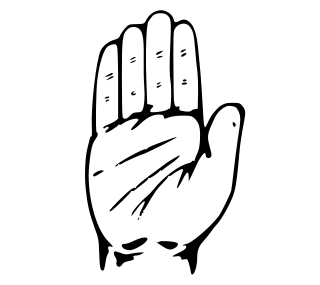
The Indian National Congress is one of the two major political parties in India, along with its main rival the Bharatiya Janata Party.The Congress is a "big tent" party whose platform is generally considered in the centre in its ideological orientation, of Indian politics. As of 2019, in the 17 general elections since independence, it has won an outright majority on seven occasions and has led the ruling coalition a further three times, heading the central government for more than 54 years. There have been six Congress Prime Ministers, the first being Jawaharlal Nehru (1947–1964), and the most recent Manmohan Singh (2004–2014).

The Indian independence movement was a series of historic events with the ultimate aim of ending the British rule in India. The movement spanned from 1857 to 1947. The first nationalistic revolutionary movement for Indian independence emerged from Bengal. It later took root in the newly formed Indian National Congress with prominent moderate leaders seeking only their fundamental right to appear for Indian Civil Service examinations in British India, as well as more rights for the people of the soil. The early part of the 20th century saw a more radical approach towards political self-rule proposed by leaders such as the Lal Bal Pal triumvirate, Aurobindo Ghosh and V. O. Chidambaram Pillai.
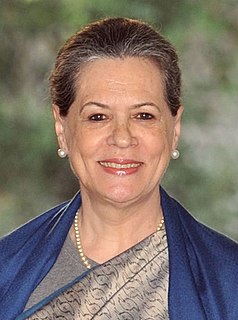
Sonia Gandhi is an Italian-born Indian politician. She is the president of the Indian National Congress, the big tent political party, which has governed India for most of its post-independence history. She took over as the party leader in 1998, seven years after the assassination of Rajiv Gandhi, her husband and a former Prime Minister of India, and remained in office until 2017 after serving for twenty-two years. She returned to the post in 2019 after her son, Rahul Gandhi, resigned.

Rahul Gandhi is an Indian politician and a member of the Indian Parliament, representing the constituency of Wayanad, Kerala in the 17th Lok Sabha. A member of the Indian National Congress, he served as the President of the Indian National Congress from 16 December 2017 to 3 July 2019. Gandhi is the chairperson of the Indian Youth Congress, the National Students Union of India also a trustee of Rajiv Gandhi Foundation and Rajiv Gandhi Charitable Trust.
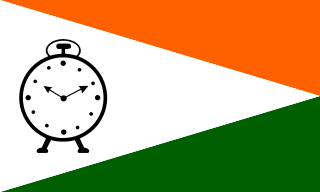
The Nationalist Congress Party is one of the eight national parties in India.
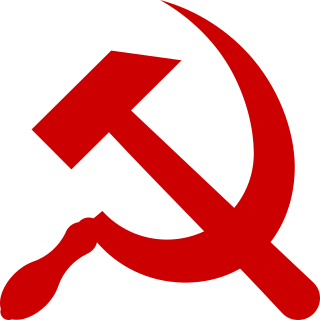
The Communist Party of India (Marxist) is a communist political party in India. It is one of the national parties of India. The party emerged from a split from the Communist Party of India in 1964. The CPI(M) was formed in Calcutta from 31 October to 7 November 1964.

Janata Dal was an Indian political party which was formed through the merger of Janata Party factions, the Lok Dal, Indian National Congress (Jagjivan), and the Jan Morcha united on 11 October 1988 on the birth anniversary of Jayaprakash Narayan under the leadership of V. P. Singh.

The Janata Party was a political party that was founded as an amalgam of Indian political parties opposed to the Emergency that was imposed between 1975 to 1977 by Prime Minister Indira Gandhi of the Indian National Congress. In the 1977 general election, the party defeated the Congress and Janata leader Morarji Desai became the first non-Congress prime minister in independent modern India's history.

Abul Kalam Ghulam Muhiyuddin Ahmed bin Khairuddin Al-Hussaini Azadpronunciation (help·info) was an Indian independence activist, Islamic theologian, writer and a senior leader of the Indian National Congress. Following India's independence, he became the First Minister of Education in the Indian government. He is commonly remembered as Maulana Azad; the word Maulana is an honorific meaning 'Our Master' and he had adopted Azad (Free) as his pen name. His contribution to establishing the education foundation in India is recognised by celebrating his birthday as National Education Day across India.

The Quit India Movement, also known as the August Movement, was a movement launched at the Bombay session of the All India Congress Committee by Mahatma Gandhi on 8 August 1942, during World War II, demanding an end to British rule in India.

The All India Trinamool Congress is an Indian political party which is predominantly active in West Bengal. The party is led by current chief minister of West Bengal Mamata Banerjee. Following the 2019 general election, it is currently the fourth-largest party in the Lok Sabha with 22 seats. Since its inception the party has been at the forefront of the anti-communist movement in West Bengal.
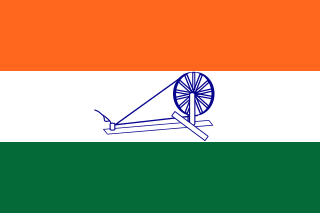
Indian national Congress established when 72 delegates from all over country met at Bombay in 1885.The prominent among those were Dadabhai Naoroji, Surendranath Banerjee,Badruddin Tyabji ,W C Bonnerji, S. Ramaswami MudaliarS.Subramanya Iyer, Romesh Chandra Dutt.Some British stood with Indians in fight and struggle for independence. A O Hume, retired British officer and servant was one of member of Indian National Congress. He realized grievances Indian were rising and feared .Until the time India gained its independence on 15 August 1947, the Indian National Congress (INC)was the central and defining influence and plateform where Indians put their grievances...

The British Raj was the rule by the British Crown of nearly all the Indian subcontinent, and some other territories, in the period 1858 to 1947. The rule is also called Crown rule in India, or direct rule in India. The region under British control was commonly called India in contemporaneous usage, and included areas directly administered by the United Kingdom, which were collectively called British India, and areas ruled by indigenous rulers, but under British tutelage or paramountcy, called the princely states. The region was sometimes called the Indian Empire, though not officially.

The Purna Swaraj declaration, or Declaration of the Independence of India, was promulgated by the Indian National Congress on 26 January 1930, resolving the Congress and Indian nationalists to fight for Purna Swaraj, or complete self-rule independent of the British Empire.

Kumaraswami Kamaraj, popularly known as Kamarajar was an Indian independence activist and politician who served as the Chief Minister of Madras State from 13 April 1954 to 2 October 1963. He was the founder and the president of the Indian National Congress (Organisation), widely acknowledged as the "Kingmaker" in Indian politics during the 1960s. He also served as the president of the Indian National Congress for two terms i.e. four years between 1964–1967 and was responsible for the elevation of Lal Bahadur Shastri to the position of Prime Minister of India after Nehru's death and Indira Gandhi after Shastri's death. He was the Member of Parliament, Lok Sabha during 1952–1954 and 1969–1975. He was known for his simplicity and integrity. He played a major role in developing the infrastructure of the Madras state and worked to improve the quality of life of the needy and the disadvantaged.

Muhammad Ali Jinnah was a barrister, politician and the founder of Pakistan. Jinnah served as the leader of the All-India Muslim League from 1913 until the inception of Pakistan on 14 August 1947, and then as the Dominion of Pakistan's first Governor-General until his death. He is revered in Pakistan as the Quaid-i-Azam and Baba-i-Qaum. His birthday is observed as a national holiday in Pakistan.

General elections were held in India in seven phases from 11 April to 19 May 2019 to elect the members of the 17th Lok Sabha. Votes were counted and the result declared on 23 May. Around 912 million people were eligible to vote, and voter turnout was over 67 percent – the highest ever, as well as the highest ever participation by women voters.